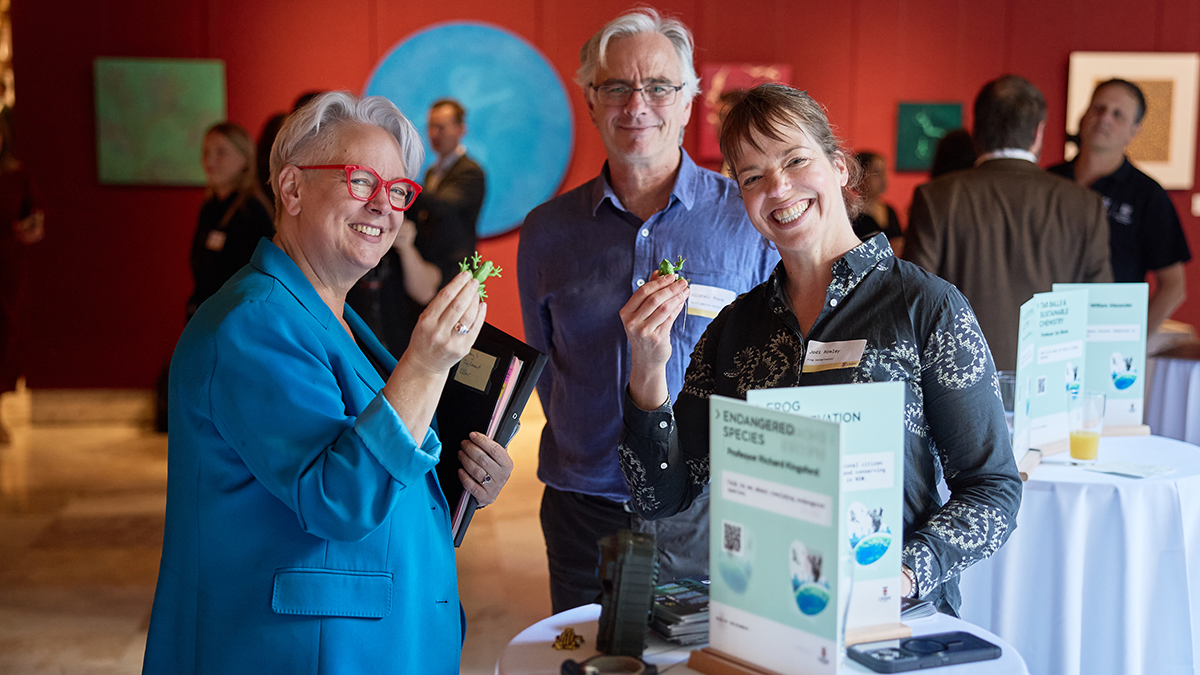
Dear colleagues
In an important display of our approach to positive societal impact, UNSW last week hosted our first-ever showcase at NSW Parliament House. We brought together researchers, parliamentarians and industry leaders to demonstrate how UNSW is already tackling some of NSW’s great sustainability challenges, and how we can collaborate to advance government priorities like housing, net zero and the energy transition, and local manufacturing. In her address, NSW Minister for Climate Change, Energy, Environment and Heritage (and UNSW alumna) Penny Sharpe said UNSW researchers offered innovative solutions to significant local, national and international challenges. It was wonderful to see this writ large at this inaugural event.
Thank you to the more than 30 UNSW research colleagues who showcased their innovative work and impact in a wide range of fields including waste recycling, clean energy storage and bushfire resilience. Helping parliamentarians and public servants get a better understanding of the breadth of UNSW expertise and areas of research, plus making personal connections, are vital to being able to provide timely assistance to government as they make significant policy decisions. Thank you, too, to Director Government Relations & Policy, Robin Schuck and the Government Relations team, for creating this opportunity for UNSW to highlight the vital role of research in shaping a more sustainable future for Australia’s premier state.
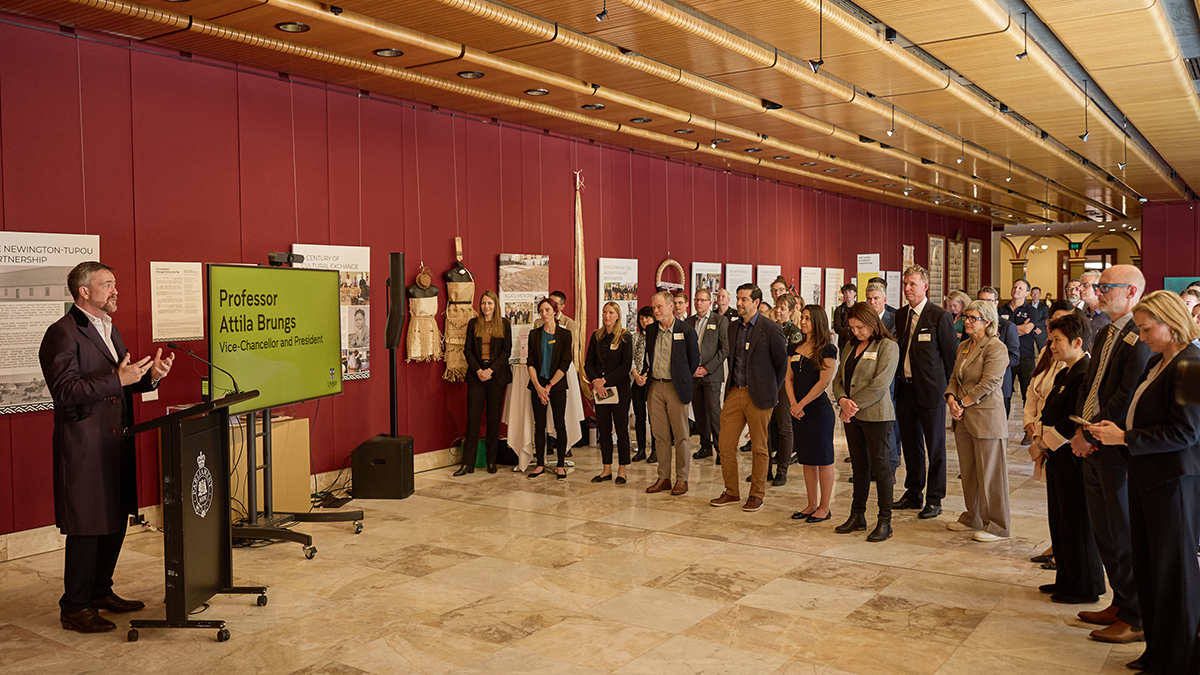
Top: NSW Minister for Climate Change, Energy, Environment and Heritage (and UNSW alumna) Penny Sharpe; Head of the School of Biological, Earth and Environmental Sciences, Professor Alistair Poore; and conservation biologist Dr Jodi Rowley at the inaugural UNSW Sustainability Showcase at NSW Parliament House.
Above: Vice-Chancellor Professor Attila Brungs addresses guests at the inaugural UNSW Sustainability Showcase at NSW Parliament House.
UNSW Gateway helping open doors for more students
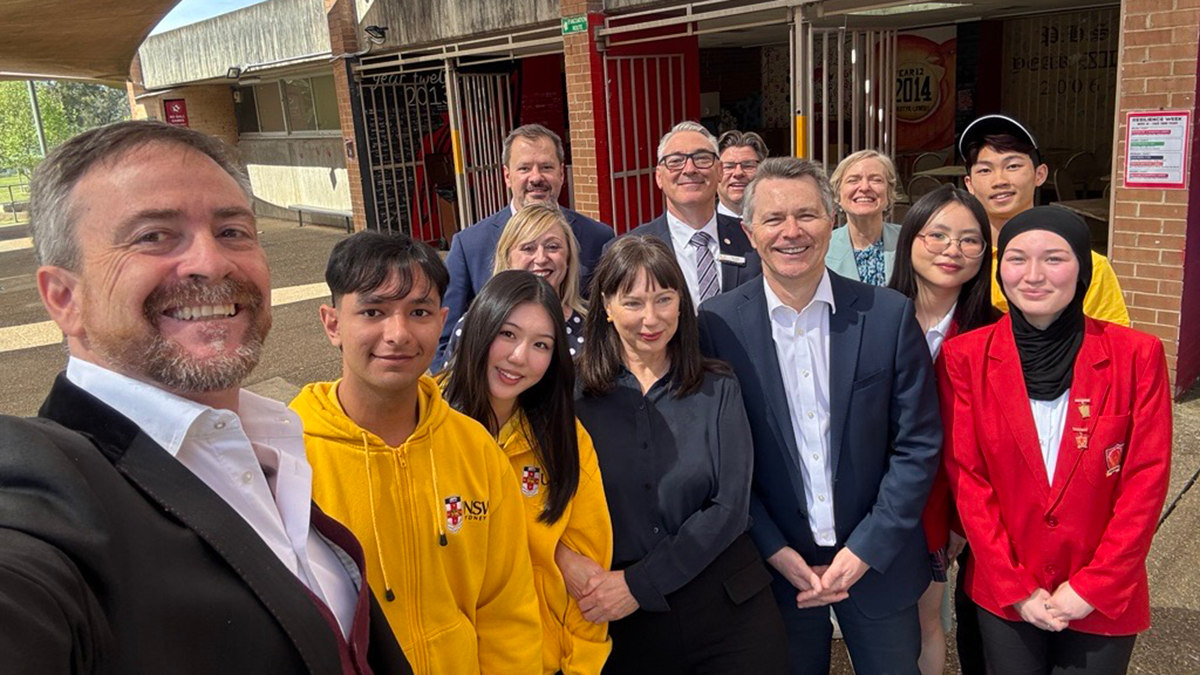
Above: Vice-Chancellor Professor Attila Brungs and Federal Minister for Education Jason Clare at Plumpton High School with representatives from the school and UNSW Gateway.
It was a pleasure to join Federal Minister for Education Jason Clare at Plumpton High School on Friday, where he highlighted a national increase in university commencements – especially among students from low socio-economic, Indigenous, regional and remote backgrounds. Minister Clare praised UNSW Gateway in creating more equitable pathways to higher education. But the purpose of the program is not just to ensure equity but as importantly, to build excellence – excellence at UNSW and excellence for Australia.
Currently, 22.6% of UNSW domestic undergraduates come from a low socio-economic background, a Gateway school or both – and we have brought forward our Gateway Equity Target of 25% to 2026. By increasing access to a broader segment of Australia and supporting their success in higher education, we increase the talent pool of excellence Australia can draw upon in these critical times. Similarly, the increase in breadth of talent entering UNSW is a fundamental aspect of increasing the excellence at UNSW, ensuring we remain one of the top universities in the world, improving our ability to deliver against our aspirational strategy – progress for all. A highlight of the morning was meeting two outstanding Gateway ambassadors, Dheyey Joshi and Katrina Meng (pictured above in yellow UNSW hoodies), who are a testament to the impact of this program in supporting students to establish an early sense of belonging at UNSW and succeed.
At UNSW, we have focused our efforts on removing the structural barriers young people face in accessing higher education. Gateway is central to that mission and our support for students begins well before they step onto campus. Our Gateway program and ambassadors work with Year 10, 11 and 12 students across Greater Western Sydney to provide the concrete tools for accessing university and experiences that support them to make informed decisions about their future. This year alone, close to 10,000 high school students participated in UNSW Gateway either as part of in-school workshops, through our online learning hub or on campus.
UNSW supports our pathway students to succeed at university with wraparound support services including access to scholarships and awards, affordable on-campus accommodation, transition support, peer mentoring and targeted academic support. Data shows students who have entered UNSW through Gateway are performing just as well as their peers in the classroom when it comes to academic performance and employability, a clear sign that when we remove barriers and provide targeted support, students can succeed – and our University and society are stronger for it. Read more on the UNSW Newsroom.
Focus on community health at the Ingham Institute Macarthur
I’m pleased to provide an update about UNSW’s Greater Sydney project and, in particular, our precincts work in Campbelltown.
The Ingham Institute for Applied Medical Research, of which UNSW is a founding partner, will soon open the Ingham Institute Macarthur, a second major medical research node in South Western Sydney. UNSW will have ongoing space in this building, which is located adjacent to Campbelltown Hospital.
When it opens in November, this will be our first physical space in Campbelltown, enabling us to expand the activities of the Faculty of Medicine & Health in the region. Having a base in the community will enable us to help address local, specific needs including Indigenous health. Through our strong links with South Western Sydney Local Health District and the Ingham Institute, and close engagement with other local partners, we hope to make a significant contribution to furthering healthy lives in the region.
Thank you to PVC Precincts Professor Zoe Terpening and all who are working hard to develop deep links where UNSW can have a valuable impact. You can read more about UNSW and the Ingham Institute Macarthur in this week’s Inside UNSW.

Above: UNSW colleagues and partners visited the near-complete Lang Walker AO Medical Research Building in Campbelltown, where the Ingham Institute Macarthur will be located.
Research Excellence Gala a cause for celebration
Between the lab, the field and the desktop, researchers don’t always have the space or time to pause, take stock and acknowledge the outstanding work they do – or its impact. Enter the UNSW Research Excellence Gala!
I was delighted to welcome more than 250 of our research colleagues to this celebratory event on Thursday evening. The reception recognised the exceptional, genuinely innovative research that colleagues are undertaking right across UNSW and how they are bringing our Progress for All strategy to life through their unremitting focus on research excellence. We are privileged to have many world-leading experts in our research community, but even more than that, global experts of today and tomorrow who are truly dedicated to discovering answers to the deepest questions and applying that knowledge to change lives in Australia and around the world. However, this is not something we can be complacent about – either as a university or a nation. Excellence such as this needs to be continually supported and invested in. This reinvestment and increase in support is a fundamental plank of our UNSW strategy and a critical point of discussion with the government.
Thank you to our researchers and colleagues in the Division of Research & Enterprise for your commitment to impact and to advancing progress for all.
International students’ big day out – water safety and a coastal walk
I am continually grateful for the events that Arc, our Division of Education & Student Experience and colleagues throughout the University organise to create a sense of belonging for our students. The Global Connections Peer Mentoring program is a shining example. For more than 175 international students, Week 1 of T3 culminated with sunshine, smiles and a scenic adventure on the Coogee to Bondi Walk. Not a bad entree to Sydney, imho!

Above: More than 175 international students walked from Coogee to Bondi on Saturday, 20 September.
The day began with a Beach Safety Briefing from Surf Life Saving NSW, and a good application of free sunscreen with thanks to partners at Medibank, who also shared information about overseas student health cover.
Thank you to the Health Promotion Unit and Student Engagement in the PVC Student Success portfolio for organising such a welcoming event – and the perfect weather. Thanks too for the support of Cultural Mentors and dedicated Health Promotion Student Mentors. What a fantastic way to help students make connections, explore, and settle into life at UNSW and Sydney.
Her Majesty Queen Nanasipauʻu of Tonga visits UNSW
A Royal visit is a rare and precious occasion. Such was last week’s visit from Her Majesty Queen Nanasipauʻu of Tonga. Her Majesty’s visit to our Kensington campus highlighted regional collaboration, led by the Kirby Institute at UNSW Sydney and the University of Sydney, to eliminate cervical cancer in Pacific nations.
The visit was a powerful endorsement of our partnership with Pacific nations in advancing women’s health. The Advancing Cervical Cancer Elimination in the Pacific program (AdvanCE) aims to make a transformative difference in multiple Pacific nations, with in-country leadership supported by Australian and regional partners.
I am grateful to colleagues from the Kirby Institute including AdvanCE program co-leads Professor Andrew Vallely and Vanessa Price for highlighting, on Tuesday, the wonderful collaborations that make this work possible. Together, we are striving to make cervical cancer a disease of the past.
Her Majesty’s support underscores the importance of eliminating cervical cancer in the Pacific, where the impact is deeply felt across families and communities.
We were pleased to co-host Her Majesty’s visit with the University of Sydney and the Australian Department of Foreign Affairs and Trade (DFAT). Thank you to DFAT for these photographs.
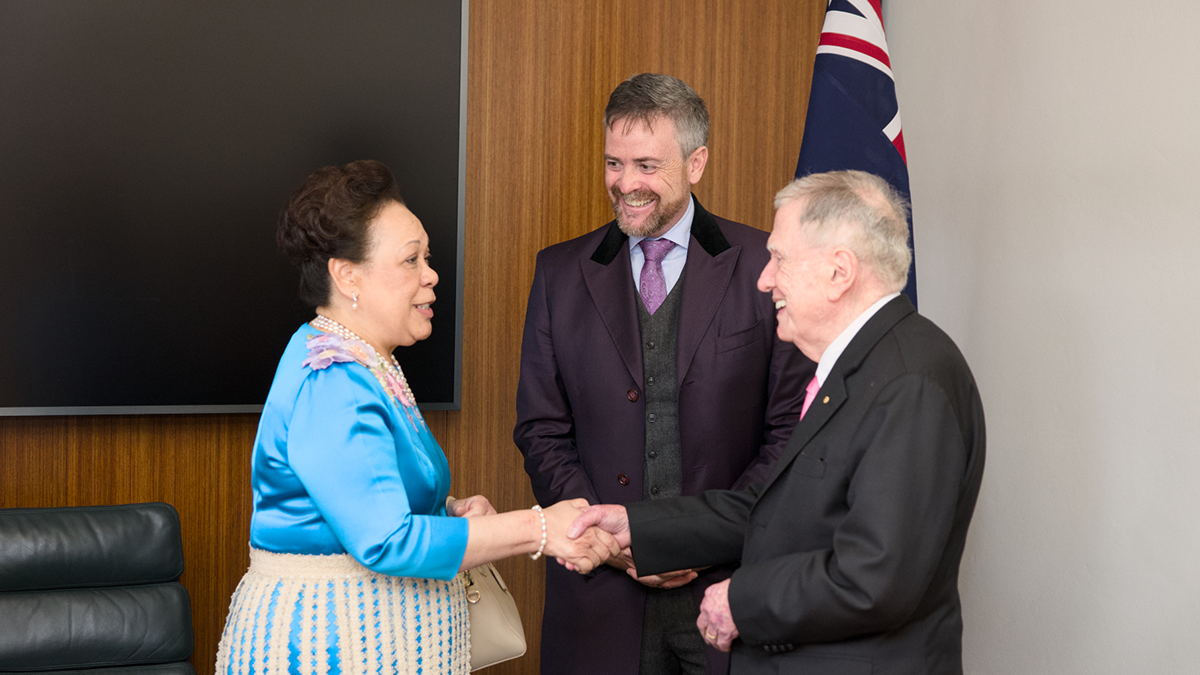



Above: Photographs from Her Majesty Queen Nanasipauʻu of Tonga’s visit to UNSW. Images courtesy of DFAT.
Focus on mental and physical wellbeing in October
I’m not sure about you but I can hardly believe October is here. Time does march on. The good news is that with October comes Mental Health Month and Health, Safety and Wellbeing Month.
Of course, paying attention to our mental health and our overall health, safety and wellbeing are important year-round, but in October we pay special attention to taking care of ourselves and our colleagues. This is an opportunity to learn practices and techniques that we can and should implement any day, any month, any year.
There is a range of activities and initiatives on offer in the coming weeks, including workshops, webinars and even a Garden Bee! I encourage you to find out what’s on at the links below and take the time to take care of your health and wellbeing during October – and beyond.
Mental Health Month | Health, Safety and Wellbeing Month
Diversity Festival 2025: Conversations that Matter
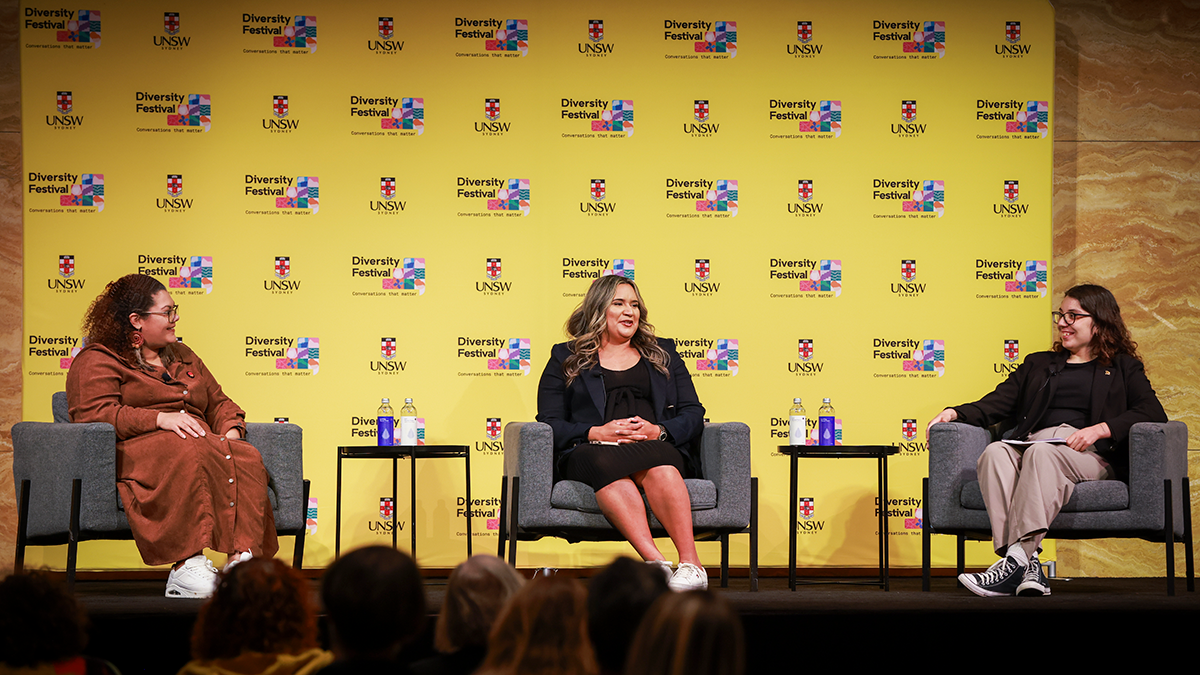
Above: Uluru Dialogue members at panel event: Belonging & what's next for constitutional recognition.
Congratulations to all who brought us a wonderful Diversity Festival last week. Year-on-year Diversity Festival builds to be an ever more vibrant, thoughtful and thought-provoking celebration of our community. The festival is anchored in Conversations that Matter, which is particularly poignant at a time when the importance of equity, diversity and inclusion has loomed large at an international level.
I was delighted to see the amazing program of activities and events throughout the week, from the tremendous Lunch Listen & Learn at Scientia, and the UNSW Languages Festival to the fantastic Quad Takeover; a host of discussions including ‘Gender Equity in Entrepreneurship’ and ‘One woman a week: how do we end gendered violence?’ with Jess Hill; and the ‘All In, All Abilities’ Sports Challenge.
Equity, diversity and inclusion are fundamental values at UNSW. We value a diversity of experiences, perspectives and identities. Each is an asset for our University culture and our ability to realise our mission of progress for all. Thank you, all, for celebrating Diversity Festival again this year.
UNSW to host National Student Governance Symposium
As the governance of Australia’s universities continues to feature in public discourse, UNSW is pleased to be hosting the Universities Australia (UA) National Student Governance Symposium on Tuesday, 14 October. The event will canvass how student voices shape inclusive and effective university governance.
Students are a vital partner at UNSW as we strive for our vision of positive societal impact. More than contributors, they’re collaborators in shaping the future of our universities. This symposium is a chance to reflect on how we build cultures of genuine partnership, where a breadth of student voices are not just heard and valued, but a de facto part of University direction setting at all levels.
Luke Sheehy, CEO of UA, and Ashlyn Horton, President of the National Union of Students (NUS), will co-host the event, reflecting the spirit of partnership at the heart of the symposium.
Find out more about the Symposium, including who should attend.
RISE Finance Lab launch
I was pleased to join colleagues and industry partners for the launch the RISE Finance Lab, co-founded and co-led by Associate Professor Kristle Romero Cortes and Associate Professor Kingsley Fong. RISE stands for Responsible, Impactful, Sustainable and Ethical finance – values that lie at the core of the lab’s mission to drive financial decision-making that prioritises fairness, inclusion and positive societal impact. The lab focuses on the social dimension of finance, tackling issues such as affordable housing, consumer protection, climate risk and financial literacy.
Already, it’s demonstrating how academic insight can shape financial practices that support social equity, climate resilience and institutional integrity. For example, its recent research on gambling behaviours offers critical insights into why harm reduction must be a central consideration in future financial policy.
I look forward to seeing how the lab will continue to shape better regulation, fairer practices and more inclusive financial systems through rigorous, evidence-based research.
The power of staff giving
The generosity of colleagues never ceases to fill my heart, as was the case at Wednesday’s Staff Giving Thank You reception for UNSW staff who give to causes at the University.
I thoroughly enjoyed meeting several students who have benefited from staff giving, including Psychology (Honours)/Law student and Gateway Ambassador Catherine Duong. Catherine is the daughter of Vietnamese immigrants and shared her story of coming to UNSW through the Gateway Admission Pathway, and what a life-changing experience that has been. Catherine remarked to the staff donors, “Your contributions don’t just create programs, they change lives like mine. You have helped students like me find excitement and motivation in the unknown, instead of settling for a security that might never have left us fulfilled.” Catherine’s openness and her own generosity as a Gateway Ambassador are inspirational.
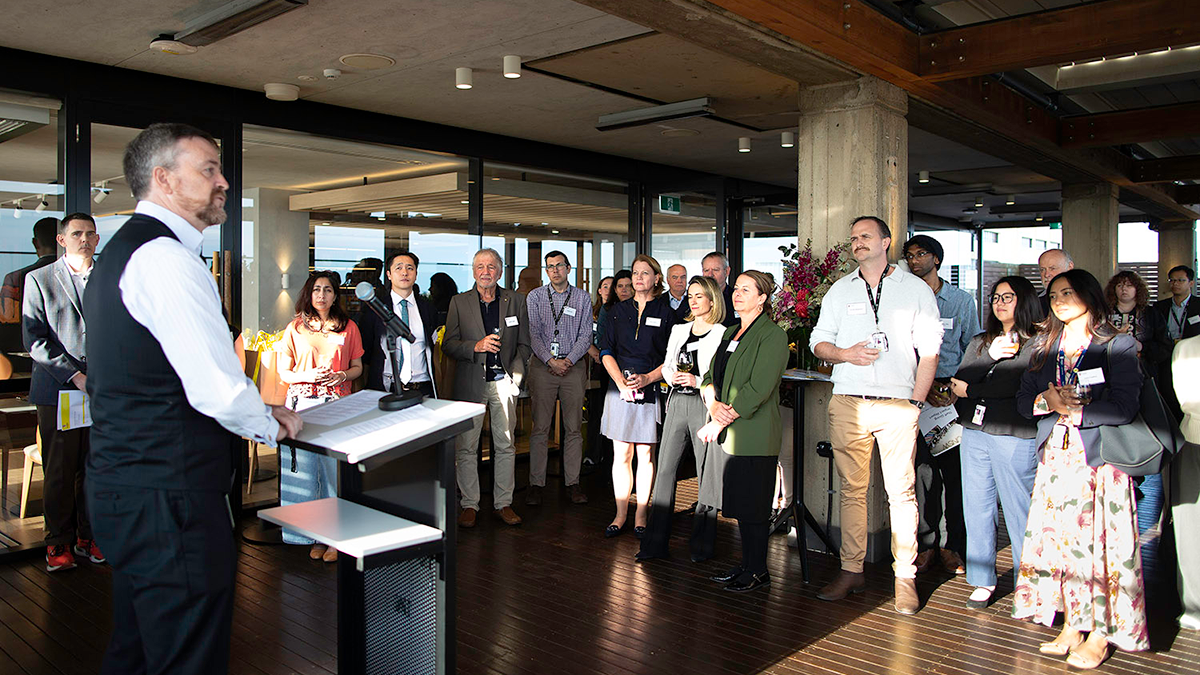
Above: Vice-Chancellor Professor Attila Brungs addresses guests at the Staff Giving Thank You reception.
As a staff donor you can have a real impact on the causes you care about, whether it be creating opportunities for students experiencing disadvantage, providing life-changing learning experiences, or supporting groundbreaking research that will make a positive difference locally and around the world. All staff donations to internal UNSW causes will be matched, dollar-for-dollar, by UNSW.
Thank you to all our colleagues who are able to make philanthropic contributions of any quantum. Your generosity has the power to transform lives. Find out more about Staff Giving.
There’s more to read Inside UNSW…
- This edition’s staff profile is of the high-flying Amanda Lum: UNSW alumna, executive assistant in the School of Biomedical Sciences and circus performer!
- AI Insider features Associate Professor Mitch Harley’s RipEye current detection tool. It’s a great example of environmental research crossing over into beach safety.
- While we’re talking about AI, on Thursday, 16 October UNSW Business School and Arts, Design & Architecture will present AI in Action | AI in Motion, a free, day-long exploration of how AI is reshaping careers, creativity and the role of business in society.
- And a third note on AI, I encourage you to read a wrap of the brilliant UNSW Societal Impact of AI Symposium that was held at The Roundhouse on 16 September.
- Several brilliant awards and accolades for colleagues this week, including Professor Ashish Sharma and Associate Professor Negin Nazarian honoured by the American Geophysical Union; Professor Maurice Pagnucco and Professor Yansong Shen elected Fellows of the Australian Academy of Technological Sciences and Engineering; and Professor Denis O'Carroll and Professor Vinayak Dixit winners of Engineers Australia Awards.
I shall close today’s newsletter with an incredible story of collegiality, courage and humanity. I would like to thank our UNSW colleagues who have provided such natural and compassionate support to postgraduate student Vinay Chansomphou from Laos. During his studies here, Vinay was diagnosed with terminal cancer and underwent intensive treatment. His courage and determination, coupled with the care of those around him enabled Vinay to complete his assessments and receive his degree in a small ceremony in hospital. I encourage you to read Vinay’s story in this week’s edition.
Best regards
Attila
Professor Attila Brungs
Vice-Chancellor & President
- Log in to post comments
